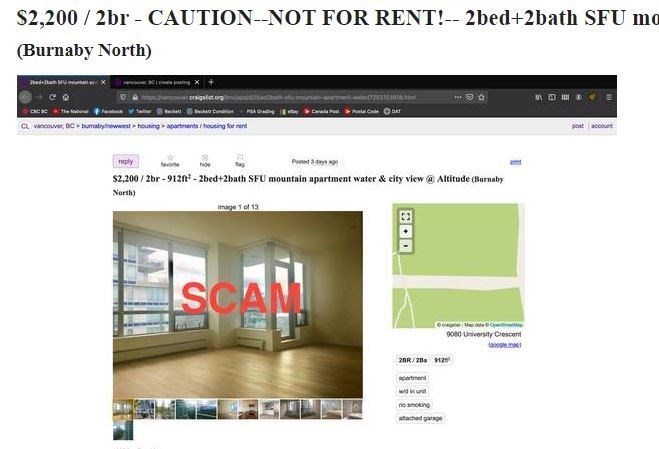All Tanya wanted to do was find a decent place for her son to live while he went to college in Burnaby.
Instead, she ended up having to help her son move after falling victim to a bait-and-switch scam.
The Ontario mom tried to find her son a place to rent by remote back in the summer. She looked at hundreds of online ads and spoke to a number of landlords about renting out a place. She was hoping to do it by remote to save a costly plane ticket.
“I figured people would stay true to their word,” said Tanya.
So after finding a place that looked decent and big, she transferred the money for a damage deposit and other fees. But when her son arrived in Burnaby to move in, he was taken to a place that was small, dirty and had a “weird smell.”
“My son texted me photos of the place after he got the keys and it wasn’t the same as the photos,” she said. “That was definitely not the place I thought we had rented. I was told, ‘Oh, that place was no longer available.’ Well, that’s not good enough.”
The place was so bad that Tanya ended up having to fly out to Burnaby to help him find a new place to live and then move in. She is now trying to recoup at least the deposit, but has been “ghosted” by the person she dealt with.
Police have discussed such scams in the past, including a landlord answering the renter’s response to the ad and telling the renter he/she lives overseas. The landlord often reassures the renter by providing copies of their passport and/or driver’s license (which are most often believed to be fraudulent). Once the renter has transferred money by internet e-transfer, money order/wire, Bitcoin and other means, the landlord will stop contact.
To better protect yourself from this type of scam:
- Use a reputable renting website or go to the property management office itself;
- Conduct an internet search on the address, see if anything suspicious is found;
- If the rental price is too good to be true – it’s likely a fraud;
- Don’t make a deposit in cash, cash is not traceable;
- Don’t wire money, wire transfers are extremely hard to cancel and trace;
- Don’t give out personal information like your S.I.N number, bank account or credit card;
- Make sure you are speaking with the landowner or property manager;
- Ask the surrounding neighbours about the landowner and property history (neighbours should be able to tell you who lives next door and if they are the owner or not)



